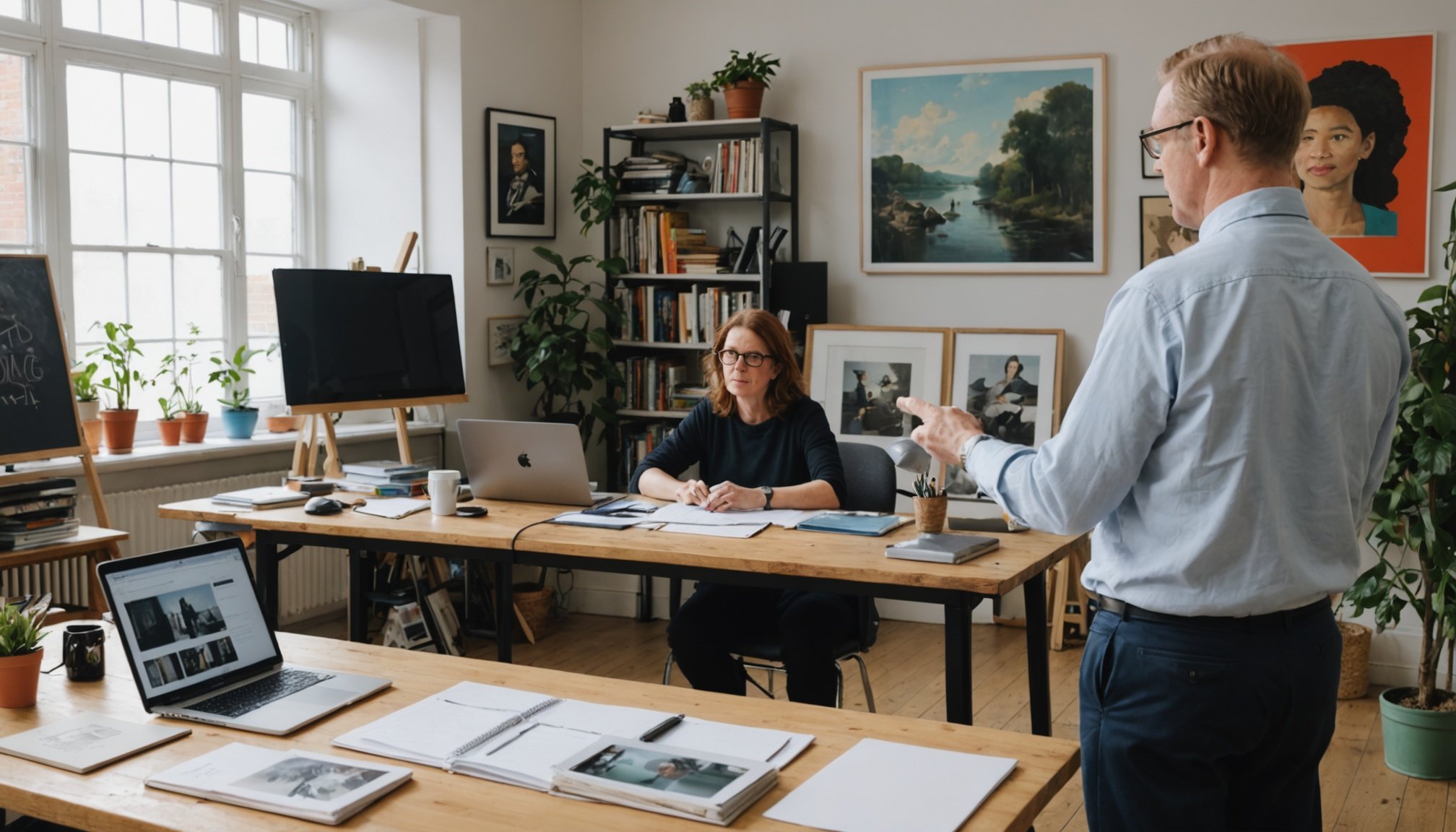Unlocking Growth: Strategies for UK Art Studios to Attract Clients Through Engaging Online Workshops
In the ever-evolving landscape of the creative industries, UK art studios are facing new challenges and opportunities. With the rise of digital technologies and the increasing importance of online presence, art studios must adapt their strategies to attract and retain clients. Here’s a comprehensive guide on how UK art studios can leverage online workshops to drive growth, innovation, and engagement.
The Importance of Online Workshops in the Creative Industries
Online workshops have become a vital tool for art studios looking to expand their reach and engage with a broader audience. These digital platforms offer a unique opportunity for artists to share their skills, showcase their work, and build a community of enthusiasts.
“Online workshops allow us to connect with people who might not have been able to attend our physical classes,” says a spokesperson from the Lowry Artist Development Programme. “It’s about unlocking opportunities and growing talent, no matter where you are in your creative journey”[2].
Building a Digital Strategy
To successfully attract clients through online workshops, art studios need to develop a robust digital strategy. Here are some key components to consider:
In parallel : Innovative Tactics for UK Music Venues to Successfully Market Upcoming Virtual Concerts
Understanding Your Audience
Before launching any online workshop, it’s crucial to understand who your target audience is. Conducting market research and analyzing data can help you tailor your content to meet the needs and interests of your potential clients.
Content Creation
High-quality content is the backbone of any successful online workshop. This includes well-structured courses, engaging video tutorials, and interactive sessions. For example, the BFI’s Global Screen Fund supports innovative independent filmmakers by boosting international development and distribution opportunities, which can be replicated in online workshops[3].
Digital Marketing
Effective digital marketing is essential for promoting your online workshops. Here are some marketing strategies to consider:
- Social Media: Utilize platforms like Instagram, Facebook, and Twitter to promote your workshops. Share behind-the-scenes content, sneak peeks, and testimonials from past participants.
- Email Marketing: Build an email list and send out regular newsletters with updates on upcoming workshops, special offers, and exclusive content.
- Influencer Partnerships: Collaborate with influencers in the art and creative sectors to reach a wider audience.
Case Study: The Lowry Artist Development Programme
The Lowry Artist Development Programme is a prime example of how an art studio can successfully transition to online workshops. Supported by Arts Council England and Salford City Council, the programme focuses on nurturing the next generation of artists by providing long-term support and resources.
“We build long-term relationships with artists, with no pressure to produce finished performances or exhibitions. We’re here for the whole journey, not just the end result,” explains the programme’s mission statement[2].
Leveraging Funding and Support
Access to funding and support is critical for art studios looking to invest in digital technologies and online workshops. Here are some initiatives and resources available:
Government Funding
The UK government has committed significant funding to support the creative industries. For instance, the recent Budget confirmed continued support for various programmes, including the Create Growth Programme, which helps creative businesses access private finance and grow their operations[3][4].
Tax Reliefs
Tax reliefs are another form of support that can benefit art studios. The UK’s world-leading film, TV, theatre, orchestra, and museums tax reliefs continue to be a boon for the sector. Additionally, a new VFX tax credit has been confirmed, set to start in April 2025, which will incentivize more film projects to use the UK’s post-production expertise[3][4].
Devolved Administrations
Devolved administrations in regions like Greater Manchester and Northern Ireland also offer specific funding and support mechanisms. For example, the £25 million devolved local growth funding for the North East will be used to build a new Crown Works film studio in Sunderland, which can also benefit art studios in the region[3][4].
Innovative Marketing Tools and Strategies
To stand out in a crowded market, art studios need to innovate their marketing strategies. Here are some tools and techniques to consider:
Word of Mouth and Community Building
Encourage past participants to share their experiences and recommend your workshops to others. Building a strong community around your online workshops can lead to organic growth and positive word of mouth.
Research and Innovation
Stay updated with the latest trends and innovations in the creative industries. For instance, the RSA’s work on creative corridors highlights the potential for regional growth through collaborative efforts between local leaders and sector experts[5].
Digital Economy and Technologies
Embrace digital technologies to enhance your workshops. Use platforms like Zoom, Google Meet, or specialized art software to deliver high-quality, interactive sessions.
Practical Insights and Actionable Advice
Here are some practical tips for art studios looking to attract clients through online workshops:
Create Engaging Content
- Interactive Sessions: Include live Q&A sessions, hands-on activities, and feedback opportunities to keep participants engaged.
- High-Quality Video: Invest in good camera equipment and editing software to ensure your video content is professional and engaging.
- Diverse Topics: Offer a variety of workshops covering different art forms and techniques to cater to a broad range of interests.
Utilize Social Media Effectively
- Consistent Posting: Maintain a regular posting schedule to keep your audience engaged.
- Behind-the-Scenes Content: Share behind-the-scenes footage or sneak peeks of upcoming workshops to build anticipation.
- Engage with Your Audience: Respond to comments and messages promptly to build a community around your workshops.
Collaborate with Other Artists and Studios
- Joint Workshops: Collaborate with other artists or studios to offer unique and diverse workshops.
- Guest Speakers: Invite guest speakers or industry experts to add value to your workshops.
- Cross-Promotion: Cross-promote each other’s workshops on social media and through email marketing.
Case Studies and Success Stories
The Northern Creative Corridor
The Northern Creative Corridor initiative is a compelling example of how regional collaboration can drive growth in the creative industries. By bringing together local leaders and sector experts, this initiative aims to create a thriving creative ecosystem in the North of England.
“We are committing to putting the full weight of the creative industries behind the Northern growth agenda – with jobs, skills, investment, and innovation as the prize,” states the RSA’s vision for the Northern Creative Corridor[5].
The Roundhouse
Marcus Davey, the leader of the Roundhouse, emphasizes the need for government support to unlock further funding for arts organisations. This support is crucial for investing in digital technologies and expanding online workshop offerings[1].
Attracting clients through online workshops is a multifaceted strategy that requires a combination of digital marketing, high-quality content, and innovative approaches. By leveraging government funding, tax reliefs, and devolved administrations’ support, UK art studios can invest in the tools and technologies needed to thrive in the digital economy.
As Culture Secretary Lisa Nandy noted, “The Creative Industries will play a critical role in helping us turn the corner and deliver on the national missions of this Government – driving economic growth into our towns and cities; drawing on the wealth of talent that exists everywhere; and flying the flag for British culture and values on the world stage”[3][4].
By embracing these strategies and staying committed to innovation and community building, UK art studios can unlock significant growth and continue to contribute to the vibrant and pioneering creative industries of the UK.
Detailed Bullet Point List: Key Strategies for Online Workshops
-
Understand Your Audience:
-
Conduct market research to identify target demographics.
-
Analyze data to tailor content to audience needs.
-
Create High-Quality Content:
-
Develop well-structured courses and video tutorials.
-
Include interactive sessions and feedback opportunities.
-
Digital Marketing:
-
Utilize social media platforms for promotion.
-
Implement email marketing campaigns.
-
Collaborate with influencers in the art sector.
-
Leverage Funding and Support:
-
Access government funding programmes like the Create Growth Programme.
-
Benefit from tax reliefs such as the new VFX tax credit.
-
Utilize devolved local growth funding.
-
Innovative Marketing Tools:
-
Use digital technologies to enhance workshop quality.
-
Encourage word of mouth and community building.
-
Stay updated with the latest trends and innovations.
-
Collaborate with Other Artists and Studios:
-
Host joint workshops with other artists or studios.
-
Invite guest speakers to add value to your workshops.
-
Cross-promote each other’s workshops.
Comprehensive Table: Funding and Support Initiatives for Creative Industries
| Initiative | Description | Funding Amount |
|---|---|---|
| Create Growth Programme | Supports thousands of creative businesses to convert creative potential into growth[3][4] | Ongoing |
| Creative Careers Programme | Improves awareness of creative career paths for school children | £3 million |
| Devolved Local Growth Funding | Supports regional projects, such as the new Crown Works film studio in Sunderland[3][4] | £25 million |
| VFX Tax Credit | Incentivizes film projects to use UK’s post-production expertise | New relief starting April 2025 |
| Supporting Grassroots Music Fund | Grants for grassroots music venues, recording studios, promoters, and festivals[3][4] | Up to £40,000 |
| BFI’s Global Screen Fund | Boosts international development and distribution opportunities for independent filmmakers[3][4] | Ongoing |
| UK Games Fund | Develops talent and awards grants to early-stage video game studios | Ongoing |
By integrating these strategies and leveraging the available funding and support, UK art studios can not only survive but thrive in the digital age, ensuring the continued growth and innovation of the creative industries.











